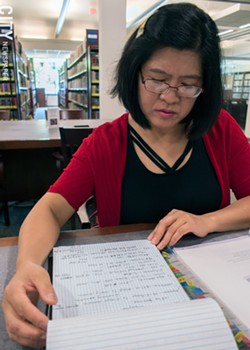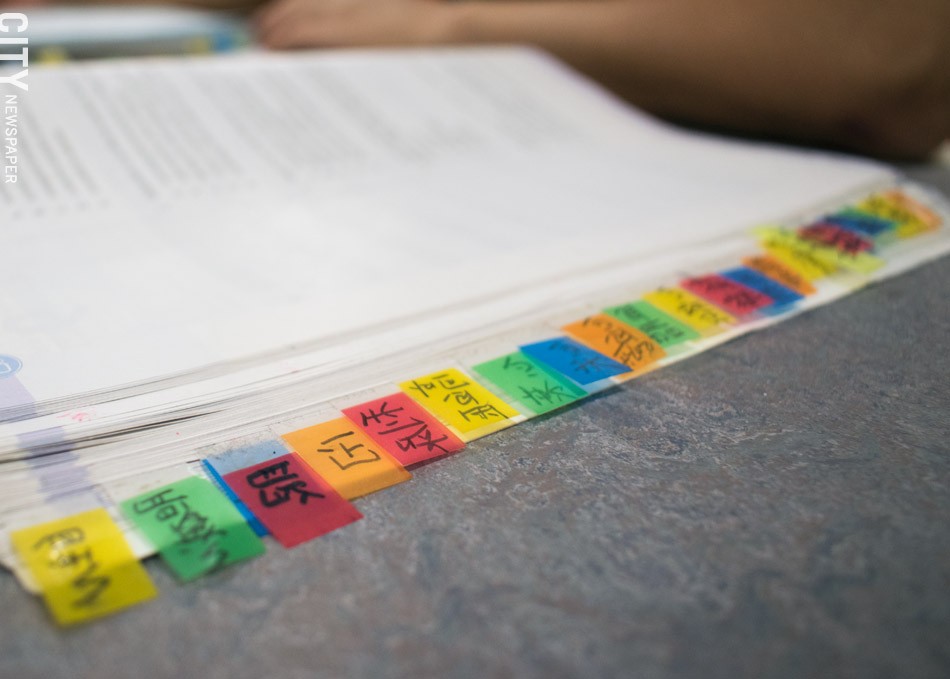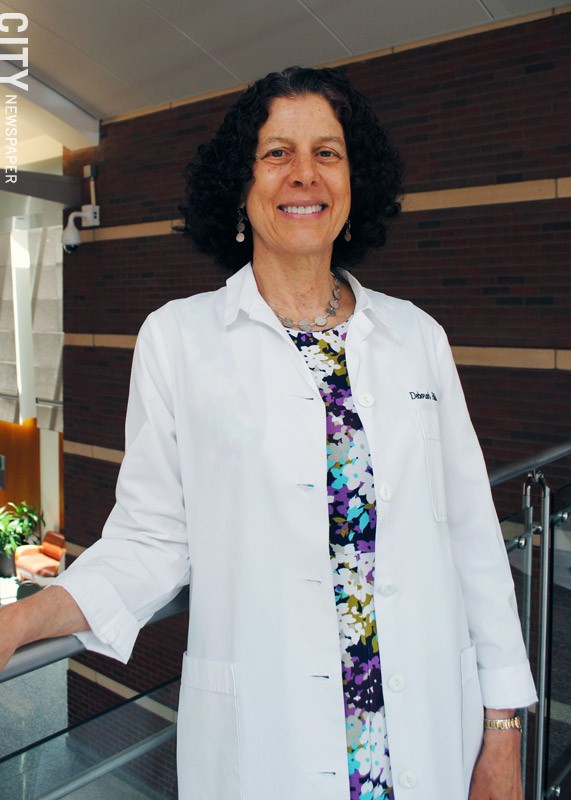*In noted places, names have been changed or only first initials are used at the request of some subjects to preserve anonymity.
In 2017, a patient walked into a Rochester-area cancer center and learned her BRCA genes had mutated. Every human possesses BRCA genes — which make proteins to suppress tumors — but when the genes mutate in certain ways, the risk of breast cancer goes from an improbability to a probability. Concerned, the middle-aged Chinese-born patient fired off questions to the physician who had delivered the news. The patient asked in Mandarin, the physician answered in English. The task of spanning the language divide fell upon the interpreter, Dali Yang.

- PHOTO BY RENÉE HEININGER
- Dali Yang had been a doctor in China and is determined to be one in Rochester. But like many other foreign-educated physicians, she faces seemingly insurmountable barriers to becoming certified.
Absorbing each word, Yang broke down the situation to both sides.
To the patient, she translated: "The doctor says the mutation is a BRCA2, not BRCA1. The difference increases the likelihood of some cancers. Chemotherapy might be necessary down the line."
To the physician: "The patient is concerned about what chemotherapy will do. Should she warn her relatives? Is she more susceptible to ovarian cancer too? Might that require surgery?"
After 90 minutes, the patient was out of questions and left. The physician turned to Yang. Most interpreters do their best to paraphrase medical conversations, but Yang seemed to repeat everything, even when the physician gave jargon-dense responses. At other times, Yang adds words to the patient's inquiries, speaking in medical vernacular uncommon to most interpreters. Not once did Yang ask for clarification.
The physician probed: How did she know so much?
Yang, who at the time was approaching age 50, explained. She had been a doctor in China and was determined to be one again in Rochester. She was studying for her medical exams. BRCA mutations were part of the previous week's review. "I don't need a doctor to explain anything to me," she told the other doctor.
Rochester is home to many older foreign-educated physicians who are licensed in their home countries, where they practiced medicine for years. But their ambitions to practice in Rochester face virtually insurmountable barriers. There are many foreign-educated doctors who go straight from a foreign medical school into an American residency. But for those who had careers abroad and are, at times, decades out of med school, getting licensed to practice in the US is near impossible.
Some foreign-educated physicians resign themselves to the reality that they will never be doctors again, content to work in health care positions tangential to their former profession, such as medical interpreters, patient care technicians, or nurse assistants. They are overqualified, but these positions allow them to stay in the field and care for patients.
Others like Yang remain resolved to practice medicine in a city with a shortage of physicians, no matter the improbability of the pursuit.

- PHOTO BY RENÉE HEININGER
- Dali Yang's textbook, filled with notes.
Upon graduating from medical school in 1992, Yang was a general surgeon at the Chinese Academy of Sciences in Shanghai. Her hospital only accepted walk-ins, and lines of patients would snake outside her office. Yang went back to school for a PhD in neuroscience, before moving to Rochester in 2004 to research alongside Dr. Steven Goldman, an esteemed expert on stem cells at University of Rochester Medical Center (URMC). She arrived with her three-year-old daughter, Qingqing, with the intention to practice surgery again.
"I had no clue how United States doctors got their licenses," Yang said over the phone, from her home in Brighton.
Before applying to residency programs in the US, foreign-educated doctors — like all aspiring residents — must pass the United States Medical Licensing Examination Step 1 and 2.
Step 1 is a cascade of paragraphs on patients and their symptoms: What do they have? What is the best treatment? Answers must come quickly. The clock is ticking and there are 280 questions. Step 1 contains a dictionary's-worth of highly-technical medical terms, a hair-greying ordeal, even for native English-speakers.
Medical school students typically set aside months to prepare for Step 1 alone. Student loans — while onerous to pay off — cover expensive books, online programs, and the luxury of studying full-time. But many older foreign-educated doctors must work full-time to support their families.
Yang had two children when she prepared to take Step 1 in the late-2000s. Battling financial and schedule constraints, she stole pockets of time each day to review the material and hone her language skills. She delayed taking the test for five years while she improved her English. But Yang said she still found herself focusing more on cracking the meaning of individual words than the larger problem.
She scored a 214 — a passing score — but a number she learned would keep her out of her desired residency programs.
Yang's son and daughter attended Brighton schools, and while her father was living with them, he was in his 70s and had Parkinson's disease. Her husband had lived in Rochester for a few years, before disappearing back to China. Yang said he has not been in contact with his family.
So finding a local residency was essential to Yang. She promised herself she would study and earn a Step 1 score high enough for any residency in Rochester. "I thought, 'If they say I need a 240, I will get a 260,'" she said.
Soon, Yang learned that regardless of her score, no area residency would accept a candidate who was so long out from medical school. If the Step exams were roadblocks to be navigated, the pathway towards being a doctor also featured an unscalable wall.
The first year Q* applied to residency programs, he sent out 60 applications and received 60 rejections. The second year, he again applied to 60 residencies — across Rochester, across the state, across the country — and again was denied for each.
Frustration set in. Q was a surgeon in Baghdad for 15 years. He completed a year-long fellowship in Glasgow and was licensed to practice surgery in the United Kingdom. He could be a doctor in most of the world, but not in his new home.
In 2013, Q moved to Rochester with his wife and two kids to flee turmoil in Iraq. Already fluent in English, he passed Step 1 and Step 2 within a year which earned him an Educational Commission for Foreign Medical Graduates license, a requirement for his residency applications.
Q reached out to physicians who advised him to acquire more active fieldwork. He began observing local doctors around their offices. Seeking more responsibility, he accepted multiple months-long fellowships at hospitals in Jordan, where he performed Laparoscopies and other digestive surgeries as he had in Iraq.
By 2017, Q felt ready to pursue American residencies. He sent out applications for positions in internal medicine, emergency medicine, and family medicine programs, as well as surgery. Each rejection stung.
"Someone told me it's like crashing into a wall," Q said of the residency process for foreign-educated physicians. If the wall is the insurmountable barrier that meets these doctors on their paths, then the graduation cutoff policy is the wall.
According to the program's website, URMC's Obstetrics and Gynecology generally considers applicants who are less than five years removed from medical school. URMC's General Surgery residency has a strict five-year cutoff and the school's Internal Medicine residency program site states no more than two years can elapse, but that "successful applicants have nearly all gone into residency within a year of medical school graduation."
Other programs, like those at Rochester General Hospital and Unity Hospital, state a preference for applicants to have graduated medical school within five years. In the hyper-competitive world of residency matching, such soft language can mean the same as a hard cutoff.
A computer system called Electronic Residency Application Service (ERAS) automatically eliminates applicants with too long a gap between graduation and application. In March, URMC received 14,000 applications for 170 positions, according to a spokesperson for the medical center. Programs need a way to filter candidates. Those five years removed from medical school are placed on the chopping block.
Dr. Richard Alweis, Associate CMO for Medical Education at Rochester Regional Health, said that this method of exclusion is due to how quickly advances are made in the field of medicine.
"If it's been more than two years, people are outside their comfort zone having you in their program," he said. "Is it fair to them that residency directors look at what they look at? No. Absolutely not."
Older foreign-educated applicants must rely on a network of information connections to secure interviews. Alweis met with Q and other aspiring older doctors to discuss paths to residencies. Applicants must often pursue less competitive specialties, rather than the areas they practiced in their home countries. Alweis says he then leans on local residency directors he knows to take a case and give foreign-educated doctors a valuable interview slot.
Q said his interviews went well, but not well enough. He graduated from medical school in 2000 and the cutoffs have been a challenge that he cannot study to overcome. "Sometimes I tell myself: Every certificate they asked me to get, I got," he said. "Every exam I took, I did well. Despite all that, I couldn't get a spot."
This September, at the age of 43, Q said he plans to begin the application process for a third time. Each attempt swallows a bit more of his pride, and he admits that he sometimes feels like a failure.
He said he knows of no foreign-educated physicians who have been admitted to a residency program in Rochester, but has a few friends who succeeded in other states. "At the end of the day, what can you do?" he said. "I don't want to become a driver or something. This is my field. I feel that I am very good in it, and I can help others. So, you keep trying."

Ahmad Stanikzai* of Brighton has stopped trying to practice medicine. His wife, Sharisa Stanikzai*, has not.
The couple graduated from Kabul Medical University during the early years of the US War in Afghanistan. Sharisa practiced obstetrics and gynecology in Kabul, while Ahmad helped the United States Agency for International Development manage health promotion clinics in local communities. The impending withdrawal of the US army forced them to consider fleeing: If the Taliban regained power, anyone connected with America was under threat. In March 2017, Ahmad and Sharisa resettled in Rochester with their young daughter.
"I had thoughts about being a doctor right away," Ahmad said over the phone. But friends warned him about the arduous exams and graduation cutoffs for residencies. "When I heard, I thought, well I could spend two-to-three years of my life studying without the promise of a residency or job," Ahmad said. "I decided it would be worth doing something different."
At first, Ahmad was offered blue-collar positions in food services, which he declined. Money was tight, but Ahmad and Sharisa decided if they could not find jobs more commensurate with their degrees, they would return to Afghanistan.
While Ahmad searched for employment, Sharisa set her mind on passing the medical exams. She had been a doctor for more than a decade, and said she wants to practice medicine for the rest of her life.
But mastering technical English was daunting. Juggling studying, finding employment, and caring for an 8-year-old child felt unsustainable at times, Sharisa said. "There is no kind of facility for foreign doctors who want to become doctors in this country," she said. "You have to do it for yourself."
Sharisa has several friends with similar backgrounds who passed both of the Step exams and still could not get accepted into residencies. She said one friend who passed with high marks is still working as a medical interpreter, her previous position before taking the exam.
"She studies, but sometimes she doesn't study hard because she doesn't have hope," Ahmad said of his wife.
Through local services, some foreign-licensed doctors find jobs in the general medical field. For example, Ahmad found work as a research coordinator at UR Medicine through the Health Professional Opportunity Grant at Rochester Refugee Resettlement Services (RRRS). Ahmad speaks enthusiastically about a new heart device his team is currently testing. "Getting back in the health sector feels great," he said. "We have these jobs. We are not that frustrated."
Sharisa also joined the RRRS staff, and she helps other foreign-educated doctors find job placements in health care. "I like to have connections with different places and help get people back in the field," she said.
But she still continues to study each week for the medical exams. Ahmad knows the dream of being a doctor never fully dies, for his wife or himself. "All the time, I think hard about taking the exam and being a doctor again, in the United States," he said.
Two years ago, Dr. Deborah Rib, Clinical Associate Professor of Obstetrics and Gynecology at the University of Rochester, overheard a friend mention a grant connecting refugees who have backgrounds in health care to jobs in local health care services. Curious, Rib reached out to Rochester Refugee Resettlement Services, and RRRS Executive Director Mike Coniff told her about the Health Professional Opportunity Grant. Coniff had trouble meeting with time-strapped physicians and was eager to recruit Rib to assist.

- PHOTO BY RENÉE HEININGER
- Dr. Deborah Rib works with Rochester Refugee Resettlement Services to help foreign-educated doctors get jobs in the health care field.
Rib said she wasn't sure what she could do, but Coniff had her begin by simply reading resumes. "I was just blown away by their qualifications and what they've done," Rib said. "They had been working in public health at international and national levels."
Soon, Rib was meeting with dozens of foreign-educated physicians — both refugees and non-refugees — to hear their life stories, what they had accomplished, and what they still hoped to do. Leaning on colleagues at Strong, Rid found work for the former doctors. She knew none of them would be physicians right away — if ever again — but at least they could be health care providers once more.
Through the grant, Rib and Sharisa have fast-tracked dozens of foreign-educated physicians into jobs as nursing assistants, phlebotomists, and patient care technicians who check blood pressure, collect specimens, and transport x-rays. Physicians who worked alongside the foreign-educated physicians raved to Rib about their performance and knowledge. Their talents were being underutilized, but not squandered.
Rib said she still hopes foreign-educated doctors are allowed to do more, one day. Rochester, like all of the United States, is facing a shortage of qualified physicians. The Association of American Medical Colleges envisions a nationwide shortage of up to 121,900 doctors by 2032.
"Look at us," Dr. Rib said. "We need more internists. We've got students here with big loans who go into specialties. Primary care doesn't pay as well."
Very few programs exist that are designed to help foreign-educated physicians practice medicine. As an example, Rib points to the Minnesota Department of Health's International Medical Graduate Program, which offers free access to career counseling, exam prep, and assistance with residency applications. The program also selects a group of foreign-educated doctors for a rigorous nine-month pre-residency training — to bring them up to speed on medical technologies and current practices — after which they enter residencies in one of Minnesota's medically-underserved urban or rural areas.
"Minnesota's doing some interesting things," Rib said. "But it's a whole state-funded program. We're just little guys seeing what we can do."
Instead of upending New York State's residency policies, Rib and RSSS focus locally. "I would love to see more doctors get into the communities to bridge cultural gaps, to promote public health," Rib said.
As an OB/GYN, Rib said she struggles to explain the purpose of tests like pap smears to patients who come from cultures where such tests are uncommon.
"In some other countries, you don't go to a hospital to get better, you go to a hospital to die," she said.
To Rib, foreign-educated physicians are ideally situated to communicate preventative health care to Rochester's immigrant populations.
Dali Yang is aware of the ways her cultural background could benefit Chinese patients. As an interpreter, she knows doctor-patient communication can get lost when she's not there. Other interpreters may have some medical knowledge, but none have expertise like those who were practicing physicians.
"I really want the medical field to pay attention to us because it definitely needs refugee or new American doctors," Yang said. "The difference from American doctors is not only language, but culture."
Yang gives the example of herbal treatments: Many older, Chinese-born patients rely on the benefits of green tea and other natural remedies, and Yang understands the importance her culture puts on these traditional treatments.
Patients have contacted her after appointments, pleading with her to get a physician's license so she can provide them with care, she said. One patient even left her a letter of recommendation: "As Mrs. Dali Yang began to provide service to me, I began to know clearly about my injury, way of treatment, and diagnosis."
"We totally get each other," Yang said. "We do have the ability, knowledge, degree, and all the culture to serve the new Americans."
Yang has never stopped believing she will be a doctor in America. Her first Step 1 results expired three years ago, which she welcomed. "Good riddance," she thought, "to an unexceptional score."
With her daughter now in college and her son becoming a teenager, Yang has more time to study. Until last winter, a group of six foreign-educated physicians — one from Afghanistan, four from Cuba, and Yang — met at Brighton Memorial Library to review definitions and diagnoses. Yang now preps on her own, cutting back on her interpreting hours to squeeze in more studying.
What motivates her to do this, to sacrifice time, energy, and money for the opportunity to come face-to-face with the residency wall? She sees frustration on the faces of other foreign-educated doctors, those who passed all the exams but still work in the medical field's more peripheral roles.
"This is my whole life goal, I don't want to do anything else," she said. "If I give up, nothing will happen. If I don't give up, I will have the chance. I can create chance."
